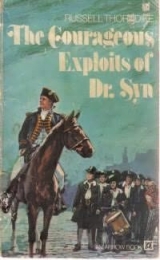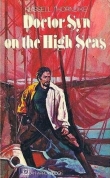
Текст книги "The COURAGEOUS EXPLOITS OF DOCTOR SYN "
Автор книги: Russell Thorndike
Жанр:
Исторические приключения
сообщить о нарушении
Текущая страница: 1 (всего у книги 16 страниц)
THE COURAGEOUS EXPLOITS OF DOCTOR SYN
BY
RUSSELL THORNDIKE
1939
To
Charles Braybrooke
Thanking him for his long and valued
association with Doctor Syn
This e-copy from Drsyn.com
compiled by Connie Lewis and Angie McCleary
FOREWORD
This is the fourth book in the saga of Doctor Syn, and, although complete in itself, follows chronologically
the events recorded in The Further Adventures of Doctor Syn
CONTENTS
1
The Yoke and the Floats ………………………………………………………………………1
2
The Two Hearts ……………………………………………………………………………….10
3
The Scarecrow Runs Up His Flag …………………………………………………………….17
4
The Scarecrow Rides To Hounds………………………………………………………………22
5
The Scarecrow Faces Mutiny …………………………………………………………………27
6
Doctor Syn at the Admiralty ………………………………………………………………….32
7
The Scarecrow’s Execution ……………………………………………………………………37
8
The Dandy Sleuths …………………………………………………………………………….41
9
Doctor Syn’s Christmas Mummers ……………………………………………………………46
10 The Scarecrow’s Rival …………………………………………………………………………50
11 The Curse of Aldington Knoll …………………………………………………………………55
12 Mysterious Cooperage …………………………………………………………………………60
13 Concerning a Cargo of Bones ………………………………………………………………….67
14 The Captain Sits Up Late ………………………………………………………………………71
15 The Removal of Captain Blain …………………………………………………………………75
1
THE YOKE AND THE FLOATS
In the days when Doctor Syn was Vicar of Dymchurch-under-the Wall in the County of Kent, a period which
covered the latter years of the eighteenth century, the Coffin Shop, presided over by his Sexton and general
factotum, Mister Mipps, was one of the chief centres for village gossip.
Situated at the cross-roads, and overlooking the vast expanse of Romney, it was the first building encountered
when entering the long straggling village street.
It consisted of a low and extenuated shed, housing a forge and carpenter’s bench, and joined to an old cottage, the
ground floor of which was utilized as a general store.
Though the cottage was known officially as Old Tree Cottage, from an ancient trunk which reared itself proudly
before its casements, the whole building was always referred to as the Coffin Shop.
And it was in the Coffin Shop that Mipps could always be found when at home. Anyone wanting to buy
anything, from a jar of pickled onions to a marline spike, would ask for it across a tresselled coffin, and wait while
Mipps retired into the store, and finally delivered it upon a coffin lid, for there was always one coffin there, which
Mipps explained as being in readiness for the next stock-size corpse that might come along.
Mipps was a thin, wiry little man, with a pointed nose like that of an inquisitive ferret. As though to balance it,
his scraggy back hair was screwed into a queue, stiffened with tar, a fashion he had adopted in the days when he had
served as a ship’s carpenter.
With the exception of Doctor Syn, who always seemed to have the best advice for everybody’s problems, there
was no one who carried more parochial respect than Mipps. Old and young would drop into his workshop with their
wants, or their gossip. Like his master, the Vicar, he was ever ready to listen to anyone’s troubles, and his
whispered solution would be followed by a nod and a look of satisfaction as his visitor departed.
These whisperings in the Coffin Shop had sometimes been looked upon with suspicion by Revenue men, which
was a great source of amusement to Mipps, who defied them to find anything against him.
“Prove that I’m the Scarecrow,” he would say, with a chuckle, “and I’ll be ever so proud. Besides I’ll be able to
retire from the undertaking business when I finds myself the head of the Romney Marsh Smugglers. I’ve heard you
say that their profits are ver good indeed. Mine ain’t very good, so a change will do me wonders.”
Very often Doctor Syn would hitch the reins of his fat white pony over the gate-post of the Coffin Shop, while he
went in to discuss parochial matters with his Sexton, and on such occasions the villagers would tactfully wait for his
departure before presenting themselves to Mipps.
It was on such an occasion that several villagers, more than anxious to receive a whispered message from Mipps,
waited dutifully till their spiritual leader should mount his white pony and ride away.
They quite understood that the Vicar’s business must come first, since Mipps was the Vicar’s man, but to most of
them there was something more important than parochial matters, namely, their next orders from the mysterious
Scarecrow who had led them for so many years against the Revenue men, without betraying his identity. Even
Mipps professed ignorance on this subject. Certainly he was often used as the Scarecrow’s mouthpiece, and passed
messages that had not been able to be given at the last meeting of the Nightriders. Sometimes, too, the Scarecrow
found it necessary to change his plans, which he was able to do through the medium of the Coffin Shop.
On the March morning in the year 1781, the Vicar’s consultation upon parochial matters with Mipps seemed to
those anxiously waiting unnecessarily long.
In the ordinary way the little knot of fishermen and farm hands would not have minded how long they were kept
gossiping outside the Coffin Shop. It was pleasant to sit on the old wall of the bridge that spanned a broad dyke
opposite the closed shed from which they could hear the swish of the plane as the old carpenter worked. Dymchurch
was a sleepy enough village in the daytime, whatever its activities might have been at night.
But these were anxious times. As they talked in low voices, they watched the evolutions of a squadron of
Dragoons, who were exercising their horses across the green meadows of the Marsh.
They had been in the village for some days, encamped with horse-lines behind the Ship Inn, in a large field that
ran to the sea-wall. They had been applied for by the Preventive Officer, who had not enough men at his disposal to
deal with the strong force for smugglers that worked under the Scarecrow.
With their plumed brass helmets and scarlet tunics, the Dragoons lent an exciting touch of colour to the village,
and since the Scarecrow’s Nightriders had thoroughly worsted them, with two runs on a big scale since their arrival,
their harmless manoeuvres did not worry them.
But a new source of danger was looming over the village, which made the gossipers all the more anxious to see
the Vicar mount his white pony and ride away, so that they could discover from Mipps exactly what the new rumour
meant.
They had just gleaned the news of the arrival that very day of men from the Royal Navy, who were to augment
the already established Dragoons.
The majority had more respect for the Navy than for the Army, and so they took the rumour which Percy had
imparted to them on the bridge very seriously.
Percy was one of the most important members of the village community. Although most of them regarded him
as the village idiot, by reason of his being overgrown, lanky, loose-lipped, round-shouldered, and slow of speech,
discerning folk realized that amongst the may sluggish cells in the brain of this seventeen-year-old lad were some
that could act with the most acute perception. In other words Percy was not always the fool that he looked.
His physical strength enabled him to eke out a reasonably comfortable living for himself and his widowed
mother, by carrying buckets of fresh water from the village well to the various cottages. With their men-fold
working on the land or sea, for most of them were either at the fis hing or farming trades, housewives were only too
happy to save themselves the walk to the well and the labour of drawing and carrying by paying Percy his moderate
charges for two buckets full of well water delivered three times a day. The humblest cottage employed him, for it
was an accepted fact that he had the monopoly of the well.
From one of his clients Percy refused payment for his services, and that was Mipps, who had long promised him
a yoke to enable him to carry the pails of water the easier.
Mipps had measured it to fit the lad’s hunched shoulders, and it was on this particular morning that he was
putting the finishing touches to the work, planing it smooth while the Vicar talked to him in whispers.
The little knot of gossipers sitting outside upon the bridge wall would have been astonished could they have
heard the drift of this consultation, which had to do with the Scarecrow’s business.
“I tell you, my good Mipps,” the Vicar was saying, “that we shall have to adopt even more carefully laid plans in
the immediate future. We are used to the methods of the Dragoons which we have dealt with before when the
Government has seen fit to billet them upon us. But the Navy is a different proposition. This Captain Blain, who
has been detailed from the Guard Ship at Dover to break up our Nightriders, is a man whose record I am well
acquainted with, and believe me he has a strategic brain. He is an opponent worthy of our steel.”
“And he comes today, does he?” asked Mipps.
“And has been invited to the Court House as Sir Antony’s guest,” nodded the Vicar.
“I don’t envy the Squire,” said Mipps. “He’s already cluttered up with the Dragoons officers. Let’s hope they
pay well for the hospitality they receive.
“The Squire feels that the Cobtrees can hardly receive compensation for hospitality,” returned the Vicar, with a
smile, “so I gather that the Government allowance of rum for the troopers.”
“Well, so long as the Squire keeps the officers away from the Vicarage,” said Mipps, “all the easier for us, eh,
Vicar?”
Doctor Syn shook his head. “That’s not my view at all,” he said.
Mipps looked at his master, and checked the query that was on the tip of his tongue. His master was thinking.
Mipps knew Doctor Sy n better than any. Had he not served under him as ship’s carpenter when his master had
walked the deck of the Imogene as Captain Clegg, flying the black flag? Watching the long thin face now he
realized that the Vicar was working out a problem, and would speak in his own good time.
Doctor Syn was an arresting figure as he leant against the coffin. He was tall, slim, elegant and alert. A smile
suddenly broke over the pale intellectual face, and Mipps was fascinated, wondering what was coming.
“I have made up my mind that Captain Blain shall not be billeted with Sir Antony Cobtree at the Court House,”
he said. “He shall be looked after at the Vicarage. We will keep a close eye on him ourselves. It might even be
necessary to see that his door is fastened on the outside. Yes, we’ll put him in the little panelled room because the
door opens outwards. A wedge, eh, Mipps?”
Mipps nodded. “Maybe as well to have him clapped under our own hatches,” he said, and then added miserably,
“but I’ll wa ger that when the time comes you’ll be letting him out so that you’ll have an opponent worthy of you
steel, as you calls him, working against us when the Nightriders are out.”
Doctor Syn chuckled. “The Nightriders may scare some folk from the Marsh when a ‘run’ is on, but I fancy it
will take more to frighten Captain Blain. Their illuminated faces, the phosphorus on the horses, their wild trappings,
as they circle in and out of the mists, will not impress Blain. No, Mipps, we must think out new methods to deal
with this Captain.”
From the village street came the monotonous wail of the lad, Percy, crying out, “Water, water.” The gossipers
saw in him a means for interrupting the conversation going on between the Vicar and the Sexton.
“Hurry up, my lad,” one of them sang out. “Old Mipps is cursing in there for want of a pail of water for his
work.”
“Percy’s on time,” rejoined the half-wit. “In a fine hurry he is, so don’t be hindering him with you talk now. The
Sexton has promised the yoke this morning, and Percy’s lost a good pint of slopping walking fast. All over my
breeches. The yoke will keep the buckets from bumping my legs.”
“You get inside,” said one of the fishermen, “or old Mipps will be out of temper, and you’ll get no yoke at all.”
“If you stop, talking, and don’t go hindering,” drawled Percy, “I’ll go.”
Percy, continuing his trade wail of “Water,” pushed his way through the Coffin Shop door, and was reprimanded
by Mipps for daring to enter when he had seen the Vicar’s white pony tethered to the gate-post.
Doctor Syn came to the rescue by saying kindly that he was glad to be there when Percy received his present of
the yoke, which Mipps had so kindly made for him.
“Let’s see you put it on,” he said.
Percy stood the buckets down and took the yoke in both hands. It was finer than he had imagined. He stroked
the smoothly shaped wood with his finger-tips, and felt the neat splicing of the ship’s rope that gripped the strong
iron hooks. He gave a gurgling moan of appreciation as he finally lifted the yoke over his head and gently lowered
it till it fitted his hunched shoulders.
“Fits shipshape and Bristol fashion,” said Mipps, eyeing his work with admiration. “Pick up the buckets, and
let’s see if all’s easy.
The Vicar bent down and raised the bucket ropes, while Mipps adjusted the hooks. The stooping Percy watched
them with anxiety.
“Now then, take the strain,” ordered Mipps.
Very gingerly the lad began to raise himself. The bucket ropes were taut and then the buckets left the floor.
When Percy saw them swinging he gave vent to another gurgle of joy.
Then he took a slow step forward.
“Steady ‘em with your hands,” ordered Mipps, “or you’ll have ‘em swinging all over the place and slopping
water worse than ever.”
“That’s it,” said the Vicar. “Now let’s see you walk down the shed.”
With wonder and ecstasy written all over his face, and his mouth wide open, Percy started on his walk down the
shop. When he reached the end he turned slowly, and grinned at his own cleverness. On the way back to his
benefactor he walked quicker, and began to call out his long-drawn wail, “Water.”
“Still slops a bit,” said Mipps critically. “But it don’t splash his breeches like it used to.”
“Just a minute, Mipps,” replied the vicar. “Something has come back to me from the old days. Do you
remember a native water-carrier, who used to fill up our ship’s barrels from the quay of San Diego? I have just
recollected a clever dodge he employed.”
“A thin-looking, half-nigger in stripe-cotton breeches?” queried Mipps. “I’ve got him. And I remember a dodge
he had, which was nothing less than highway robbery, saying he’d filled the barrels when he’d only drained ‘em out,
and tilted the same water back again. I remember catching him at it and drawing my claspknife across his throat,
saying that if pork was in season I’d have him for it. Was it that dodge you was thinking of, Vicar? You was
preaching at the Red Injun Ch ristian church at the time.
“No, my good Mipps, though I remember the fellow as a rascal,” laughed Doctor Syn. “I’ll show you what his
dodge was. Saw me this bit of wood in half.”
He handed Mipps a scrap of wood which he picked up from the carp enters’ bench. Mipps sawed it through.
Doctor Syn took the two pieces and placed one in each of the buckets of water.
“Floating islands,” he explained. “Now with these on the surface of the water, Percy will find that the ripples of
water will break upon their edges instead of against the rims of the buckets. It will avoid the splashings. I wonder,
when I have seen poor Percy’s breeches so splashed, that I have not thought of this dodge to save him from catching
cold before. Doctor Pepper will be spared a good deal of physic in the future.”
When Percy repeated his walk down the shop, he received no splashes from the contents of the buckets, which
caused him to utter a succession of admiration gurgles at the new miracle.
Mipps picked the two pieces of wood from the water and threw them aside, and taking another section, sawed it
in half, chislled them round, planed and polished them, and dropped them, into buckets.
“Never spoil a good ship for a bit o’ tar,” he said. “Now then, Percy, get a quick step into you, and see if Doctor
Syn don’t deserve to have free delivery of well-water same as me.”
The miracle worked, and Mipps added tactfully, “This is the reward of our missionary efforts amongst the bloody
heathen, Vicar.”
“Water, water,” cried Percy, as he walked the shop once more in rehearsal for his daily rounds in the future.
“Oh, and that reminds me too,” added Mipps. “Your voice, my good lad, gets on my nerves same as it do the
Squire and the Vicar. No more of that horrible gloomy cry of yours, because I’ve whittled you a whistle what you’ll
blow instead of howling. It shrills sweeter than a Bos’n’s pipe, and I’ve fixed a lanyard for your neck, so as if you
blows it out of them noisy lips of yours it won’t drop overboard as the saying is. Here it be, so put it on and tell you
clients that the cry of water will be no more heard in the land of Israel as ‘Oly Bible says.”
Over Percy’s neck he hung a whitened cord attached to a large wooden whistle, which he thrust into Percy’s
loose mouth.
“Now then, blow, and blow hard to make it heard by the housewives,” he ordered. “And no more horrible
howlings when you’re rounding the Horn with your craft.
Once more Percy walked proudly down the shop, blowing hard upon his instrument, which sounded shrill and
clear.
“Learnt to make whistles, I did,” he explained, “from an Injun, when I and the Vicar was preaching ‘em the
Blessed gospels.
Suddenly Doctor Syn held up his hand for silence.
“I can hear another pipe,” he said.
Mipps went to the back casement and opened it, cocking his head sideways. “You’re right, Vicar. And a drum
tapping, too. It will be them Navy men marching towards us along the Hythe road.”
“They are to be billeted in my Tythe Barn,” said Doctor Syn. “You, Percy, had better get along there to be in
readiness, if you want to get their order for water. You can tell them that you have already got the job with the
Dragoons. I think, Mipps, we will ride along to welcome them.”
The waiting crowd of gossipers were disappointed when they saw Doctor Syn mount his pony and wait for Mipps
who was whistling to an aged donkey that was browsing lazily in a meadow behind the shop.
This animal, who rejoiced in the name of Lightining, because he never hurried, was officially the churchyard
donkey, where he would pull the roller over the grass between the grave stones.
Mipps ran to meet him as he slowly walked across the meadow in answer to his master’s call.
Slipping an old bridle over his head, Mipps clambered up on to the animal’s hind quarters, and grasping a rein in
each hand he manipulated his course as though he were steering with rudder strings.
Indeed there was never any doubt as to Mipp’s old vocation, even without his continual boasting on the subject,
for whatever he did smacked somehow of the sea.
Meantime the sound of the drum and fife grew nearer, and although Percy was anxious to take his first proud
walk with his yoke along the village street, he thought it wisest to go the short cut across the fields in order to reach
the Tythe Barn before the arrival of the Navy men.
He had made a good contract with the Dragoons. He could not carry all the squadron buckets for horses and
men, but he had insisted on his right to work the windlass on the well, and for each ten pailfuls he was paid one
penny by the Quartermaster. He hoped to secure an even better bargain from the naval men, and as he swung along
over the fields behind the village, he rehearsed what he would say.
While Doctor Syn waited for Mipps to steer his mount on to the road, he exchanged morning greetings with his
parishioners, apologizing for having immediate need of his Sexton, and urging them, as they appeared to be at a
loose end, to hurry along the street to the other end of the village and to give the strangers a hearty welcome within
their gates.
“What with those gallant Dragoons cantering over there,” he said, “and these jolly sea-dogs arriving from Dover,
we hope that soon o ur village will be free of this wretched smuggling business, and that the mysterious Scarecrow
will trouble the March no more.
“If they catch him, sir,” replied one of them, “it will be a great occasion when he comes to be hanged. Would
they try him at the Court Houses, sir?”
“Of course,” nodded Doctor Syn. “As Leveller of Marsh Scotts, our good Squire would preside, and he would be
judged by the Lords of the Level. As you say it will be a great occasion. He has given our good Marsh an evil
reputation for too long. They talk about the Scarecrow even in busy London, where you would think they had
enough criminals of their own, without concerning themselves with ours.”
“But he does concern ‘em, sir,” went on the fisherman. “They say he not only lands the goods hereabouts and
takes it to the ‘hides,’ but looks after their disposal with the receivers in London. All I can say is that if that’s true
he must be busier than I’d care to be. It’s one thing to ride the Marsh, and scare honest folk from off of it, but
another to run the business side as well.”
Doctor Syn nodded. “He must be a very busy man indeed. I like hard work myself, but after riding the Marsh all
day looking after my scattered flock, I find parochial accounts very irksome in the evenings. What you have said
makes me feel almost sorry for the Scarecrow. I only wish he would rest from his ill-chosen labours.”
As soon as Mipps had persuaded Lightning on to the road, Doctor Syn led the way along the street, followed at a
respectful distance by the villagers, who were joined by others as they passed the scattered cottages and shops, so
that by the time they had entered the Avenue on the way to the church, they mustered a considerable crowd, and
completely blocked the roadway.
The Dragoons, who had finished with their morning exercise, and had trotted in sections of fours behind their
squadron leader, Major Faunce, were obliged to break down into a walk and finally to halt.
The Major by riding on to the footpath was able to bring his charger to the front, where he reined up alongside
Doctor Syn.
“Good morning, Major,” said the Vicar. “It seems that it is a case of ‘All the King’s horses and all the King’s
men,’ come to rid us of our parochial danger. I begin to think that it is money thrown away. I cannot think that the
Scarecrow is of flesh and blood. Do you really think he will ever be caught?”
“If the Navy catches him,” replied the handsome young office, “I will agree that we of the Army are the second
service.”
“They make a brave show,” went on the Vicar, watching the party of sailors swinging towards them along the
winding road.
A tall, thin, hard-bitten naval captain, riding a gaunt charger loaned from the garrison at Dover Castle, headed the
procession of marching, whistling seamen. Behind him wee two little powder-monkeys, one beating lustily upon a
deep side-drum and the other causing a long wry-necked fife to squeal forth a jolly hornpipe to which the company
responded with a swin ging step and a carefree manner.
“I’ll say this for that naval officer,” remarked the Dragoon, “that he sits a horse as though he can ride.”
“Which is more than one can say for most that follow the sea,” put in the Vicar. “Take Mipps, there, my Sexton.
True, he is only mounted upon an ass, but he makes its hindquarters look like thwarts. His is mentally in a boat and
not upon an animal. Why? Because he once followed the sea as a carpenter. I agree that officer rides, even though
his charger walks. One can see that he could follow the hounds.”
“Got a bit of a name, I understand,” went on the Dragoon, “as a prize martinet.”
“A necessary qualification, too,” replied Doctor Syn, “in order to control those jolly dogs.”
“The Scarecrow might well be conceited,” laughed the Major, “if he could only have seen this arrival.”
Perhaps he is here, who knows?” returned the Vicar, looking round upon the staring villagers.
Just then the general interest taken in the approaching detachment was interrupted by a shrill whistling that jarred
against the notes of the nautical air, so proudly blown by the sturdy likkle powder-monkey on his fife.
It was Percy marching beneath his yoke, and blowing lustily upon his new whistle. The crowd roared with
laughter as he strutted from the churchyard to the open space before the Court House, where he took up his position
immediately beneath the gallows.
The Major leant down from his tall charger and whispered to Doctor Syn, “You don’t think he is the Scarecrow,
do you?”
The Vicar looked towards the water-carrier, smiled and shrugged his shoulders.
“That’s an idea certainly,” he whispered back. “I often think that perhaps poor Percy is not quite so simple as he
looks. He would certainly have good opportunity for passing his orders amongst the villagers, if any of them should
be in this dastardly business, which I can never bring myself to think. Against your theory though, we must
remember that both of us have seen the Scarecrow riding, showing a sash that is sadly lacking in that poor lad. No, I
don’t somehow think that Percy can claim that notoriety. Far more likely that he is somebody used to following the
hounds with the Squire, and yet I can think of no one in that category of daring riders who can show the promised of
the Scarecrow’s brain. I think the nearest we ever got to a solution of his mysterious identity was when we tried to
fit that equally elusive rogue Jimmie Bone into the role. But the Scarecrow quickly put him to rights by robbing him
before witnesses of what he had robbed from them. Perhaps the Scarecrow is really the Devil all the time.”
The conversation was terminated because the Captain of the Navy men called a halt.
Doctor Syn rode forward saying: “Welcome to you and to you gallant men, Captain Blain. I am Doctor Syn, the
Vicar here, and I voice the whole parish in saying that Dymchurch is at your service, sir.”
“Thankee, parson,” returned the Captain. “Stand easy, men,” he rapped out, turning in the saddle. “You’re here
on shore duty, but that don’t mean that man-o-war discipline is relaxed. So behave yourselves, and no chalking
drinks at the inns, mind. Bos’n, take charge while I see to the billeting.”
Doctor Syn pointed out the big Tythe Barn in the Vicarage grounds, near by, and said that both he and the Squire
were in agreement that this was the most suitable place for housing the men.
The Captain merely said he would like to see it, and was setting off with the Vicar when the Major introduced
himself, saying that he was very ready to co-operate in the work against the smugglers. To this the Captain made no
sort of acceptance, beyond a gruff grunt, and adding: “Till I have had time to look around and get the strength of the
situation, I cannot say, sir, whether I shall favour cooperation or no. If I find that I want the help of your troopers, I
will let you know all in good time.”
Doctor Syn noted that this somewhat churlish attitude from the Captain was resented by the Major of Dragoons,
who turned his charger and ordered the crowd to stand back, if they didn’t wish to be ridden down. He then sang out
the orders for the squadron to proceed to the horse-lines behind the Ship Inn.
The crowd fell back to let them pass, and then began the volleying of jests between the two branches of the
service.
The sailors, seeing that their Captain was riding away towards the church and vicarage, in company with the
parson, indulged in such taunts as, “Put your little horses away, and don’t let the nasty Scarecrow steal ‘em.”
“You get back to your little hammocks on the guard Ship,” retorted a trooper, riding by. “The Scarecrow ain’t
afraid of little cutlasses and hand-spikes. But he don’t like sabres.”
“He’s never seen ‘em,” scoffed another of the sailors. “You know little boys ain’t allowed out on the Marsh at
nights.”
“You wait till you see us jumping them infernal dykes, while you slips into ‘em, water spaniels.”
The Major, secretly amused, nevertheless thought it his duty to stop further bandying, so rapped out, “Silence.”
The Bos’n, also amused, nevertheless, thought it fit to show his authority too, so sang out, “Fall in.”
The sailors who had rested their kit-bags on the low churchyard wall, hoisted them on to their shoulders once
more, and falling into line began to whistle a sea-song, which encouraged the powder-monkeys to fall to again at
their instruments.
Some distance away, Percy blew louder on his whistle.
The Vicar, riding by him with the Captain, interrupted his remarks about the Tythe Barn which they were
approaching by turning to the water-carrier and saying, “That’s enough, my lad, for now.” They were walking their
horses, or rather the Captain was walking his, and Doctor Syn ambled along to keep pace, Mipps following at
respectful distance on his donkey.
Though the Vicar was chatting about the barn and pointing out the end of it jutting out behind the Vicarage, he
was mentally weighing up the naval officer.
As tall as himself, and sitting straight in the saddle as though he carried a ramrod in his back, his borrowed
charger gave him the advantage in height, so that from his little fat pony the Vicar had to look up at him.
The Captain’s face, he saw, was hard and deeply lined, but his one eye had a roguish twinkle. He had lost the
other against the French. His voice was deep and husky, and his neat-fitting uniform suggested that here was a man
who would keep his vessel trim and brisk. The look of the Captain reminded the Vicar of his own past, for just such
a man had Doctor Syn once been, when he had sailed under the black flag as Captain Clegg. By the time they drew
rein at the barn he had come to the conclusion he had expected to arrive at by what he had heard of Captain Blain,
namely, that here was a personality to whom even the dashing Scarecrow had better show respect.
Aye, Captain Blain was certainly an enemy who would give the best a good fight both with strength and wit.
“It’s a g ood barn, Captain,” remarked Doctor Syn. “Plenty of room inside it. My Sexton here, Mister Mipps,
keeps it all shipshape.”








